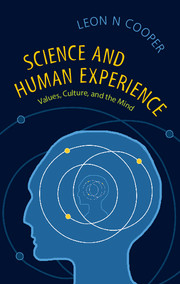Book contents
- Frontmatter
- Dedication
- Contents
- Preface
- Acknowledgement
- Part One Science and Society
- 1 Science and Human Experience: (Mephistopheles Is Alive and Well and Living in the Space Age)
- 2 Does Science Undermine our Values?
- 3 Can Science Serve Mankind?
- 4 Modern Science and Contemporary Discomfort: Metaphor and Reality
- 5 Faith and Science
- 6 Art and Science
- 7 Fraud in Science
- 8 Why Study Science? The Keys to the Cathedral
- 9 Is Evolution a Theory? A Modest Proposal
- 10 The Silence of the Second
- 11 Introduction to Copenhagen
- 12 The Unpaid Debt
- Part Two Thought and Consciousness
- Part Three On the Nature and Limits of Science
8 - Why Study Science? The Keys to the Cathedral
from Part One - Science and Society
Published online by Cambridge University Press: 05 November 2014
- Frontmatter
- Dedication
- Contents
- Preface
- Acknowledgement
- Part One Science and Society
- 1 Science and Human Experience: (Mephistopheles Is Alive and Well and Living in the Space Age)
- 2 Does Science Undermine our Values?
- 3 Can Science Serve Mankind?
- 4 Modern Science and Contemporary Discomfort: Metaphor and Reality
- 5 Faith and Science
- 6 Art and Science
- 7 Fraud in Science
- 8 Why Study Science? The Keys to the Cathedral
- 9 Is Evolution a Theory? A Modest Proposal
- 10 The Silence of the Second
- 11 Introduction to Copenhagen
- 12 The Unpaid Debt
- Part Two Thought and Consciousness
- Part Three On the Nature and Limits of Science
Summary
It is often said that it is important for students to study science. Is it really necessary for those who don't plan on careers in the sciences to study or understand science? Who should study science and why?
This essay is based on an article originally published in the Brown Alumni Magazine in July 1990.
On this hundredth anniversary of Kamerlingh Onnes' discovery of superconductivity, we may well reflect on the technological and theoretical marvels that are the descendants of his discovery. We may also reflect on the benefits science has showered on us (antibiotics and modern electronics to mention just two). Young people who want to participate in this adventure on a professional level must become technically proficient, so of course they must study science.
But why study science if you don't intend to become a scientist? Why should a lawyer, businessman, or artist study science? We might just as well ask: Why should they read Kemal, Kaya, or even Shakespeare? Why should they watch TV or drink beer?
I would like to present the antique and possibly quixotic view that we should study science because it can give us pleasure. Now the notion of pleasure associated with the physics or chemistry we remember from high school is a hard sell.
- Type
- Chapter
- Information
- Science and Human ExperienceValues, Culture, and the Mind, pp. 68 - 69Publisher: Cambridge University PressPrint publication year: 2014



